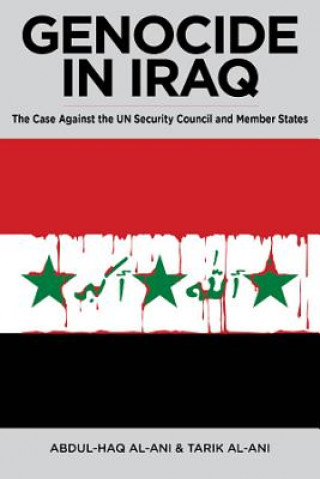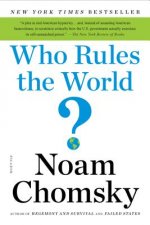
Kód: 01211554
Genocide in Iraq
Autor Abdul Haq Al Ani
Imposing sanctions on Iraq was one of the most heinous of crimes committed in the 20th century. Yet it has received little attention in the Anglo-American world. Despite the calamitous destruction resulting from the sanctions, no ... celý popis
- Jazyk:
 Angličtina
Angličtina - Vazba: Brožovaná
- Počet stran: 167
Nakladatelství: Clarity Press, 2013
- Více informací o knize

707 Kč
Dostupnost:
50 % šance Máme informaci, že by titul mohl být dostupný. Na základě vaší objednávky se ho pokusíme do 6 týdnů zajistit.
Máme informaci, že by titul mohl být dostupný. Na základě vaší objednávky se ho pokusíme do 6 týdnů zajistit.Prohledáme celý svět
Mohlo by se vám také líbit
-

Painterly Days Pattern
628 Kč -

Chieftain
257 Kč -

Culture and Values
3214 Kč -

Correlations and Connectivity
6536 Kč -

Interface Controlled Organic Thin Films
5060 Kč -

Little Girl in Old Philadelphia
965 Kč -

Cambridge Black Star English for Senior High Schools Teacher's Guide 2
124 Kč
Darujte tuto knihu ještě dnes
- Objednejte knihu a zvolte Zaslat jako dárek.
- Obratem obdržíte darovací poukaz na knihu, který můžete ihned předat obdarovanému.
- Knihu zašleme na adresu obdarovaného, o nic se nestaráte.
Informovat o naskladnění knihy
Zadejte do formuláře e-mailovou adresu a jakmile knihu naskladníme, zašleme vám o tom zprávu. Pohlídáme vše za vás.
Více informací o knize Genocide in Iraq
Nákupem získáte 71 bodů
 Anotace knihy
Anotace knihy
Imposing sanctions on Iraq was one of the most heinous of crimes committed in the 20th century. Yet it has received little attention in the Anglo-American world. Despite the calamitous destruction resulting from the sanctions, no serious attempts by legal professionals, academics or philosophers have been undertaken to address the full scope of the immorality and illegality of such a criminal and unprecedented mass punishment. "Genocide in Iraq" offers a comprehensive coverage of Iraq's politics, its building, its destruction through aggression and sanctions, and an analysis of the legality of these sanctions from the point of view of international and human rights laws. It presents a detailed policy analysis indicating how, under Ba'ath rule, Iraq had risen to become - before 12 years of total sanctions were globally enforced - the most progressive and developed Arab nation in the Middle East. It then contrasts that rising nation to the devastated remains left in the aftermath of sanctions, which nonetheless was yet to endure, in 2003, the full force of the American "shock and awe" invasion. The book explains why it was necessary to occupy Baghdad. It also puts forward the uniqueness of Iraq as at the heart of both Sunni and Shi'a theology, arguing it was this very centrality of Iraq, which far outweighs the significance of Arabia in socio-economic, religious and geostrategic dimensions, that at the same time makes Iraq a target. It details the building of Iraq by the Ba'ath regime, part of which was done with remarkable speed, putting to rest the argument that other countries in the area were developed at a similar pace. It also details the devastation of Iraq by 2003 after 12 years of sanctions - a devastation so dreadful that by the UN's own accounting, some 500,000 child deaths were due to it; a devastation so pervasive and overwhelming that two of the UN's own key administrators of the sanctions program, Dennis Halliday and Hans von Sponeck, resigned in protest. No other book published in English has made such an in-depth research and comparison of the two eras. Although previous books may have touched on the breach of international law through sanctions, this book, while making similar arguments on the breach of international humanitarian and human rights law, goes further and argues that the Security Council itself, member states and the individual relevant members of the governments of that period are guilty of these crimes. More significantly, the book argues for the first time that imposing total sanctions is the equivalent of committing genocide. It challenges the argument by some that there is any need to establish specific intent to establish the crime of Genocide. In its section dealing with the Sanction Committee, it demonstrates how one man at any time could hold the whole of Iraq to ransom by denying the export of items so vital to the basic survival needs of millions. The little that has been written has concentrated on a single aspect of the effects or consequences of the sanctions; mostly in articles in dedicated journals whose readership is limited. But as the crime of genocide is one on which there is no statute of limitations, it is hoped that this book will serve not only as an indictment of and barrier to future global imposition of sanctions, but also as a tool in bringing the actual perpetrators of this crime to a Nuremberg-style day of judgment.
 Parametry knihy
Parametry knihy
Zařazení knihy Knihy v angličtině Society & social sciences Politics & government International relations
707 Kč
- Plný název: Genocide in Iraq
- Autor: Abdul Haq Al Ani
- Jazyk:
 Angličtina
Angličtina - Vazba: Brožovaná
- Počet stran: 167
- EAN: 9780985335304
- ISBN: 0985335300
- ID: 01211554
- Nakladatelství: Clarity Press
- Hmotnost: 388 g
- Rozměry: 154 × 229 × 17 mm
- Datum vydání: 01. March 2013
Oblíbené z jiného soudku
-

On Palestine
276 Kč -

Prisoners of Geography
254 Kč -

World Order
303 Kč -

International Relations, Global Edition
2700 Kč -

Grand Chessboard
561 Kč -

Diplomacy
498 Kč -

Clash of Civilizations and the Remaking of World Order
410 Kč -

Hundred-Year Marathon
420 Kč -

The Spy and the Traitor
323 Kč -

Understanding the Intelligence Cycle
1811 Kč -

Who Rules the World?
303 Kč -

Who Rules the World?
302 Kč -

Dead Aid
429 Kč -

World Order
378 Kč -

Adults In The Room
378 Kč -

Legacy of Ashes
476 Kč -

Evolution of Cooperation
471 Kč -

Strategic Vision
410 Kč -

Secret World
542 Kč -

Geopolitics and Geoculture
543 Kč -

Dawn of Eurasia
303 Kč -

How Spies Think
323 Kč -

Gaza in Crisis
303 Kč -

Planetary Cycles Mundane Astrology
479 Kč -

OVERTHROW : AMERICA'S CENTURY OF REGIME
624 Kč -

Is the EU Doomed?
609 Kč -

Righteous Victims
592 Kč -

Directorate S
431 Kč -

Europe's Border Crisis
1121 Kč -

America's Strategy in World Politics
1763 Kč -

Destroying Libya and World Order
481 Kč -

amantes del fin del mundo
568 Kč -

My Nationalist Pony
854 Kč -

Critical Practices in International Theory
5061 Kč -

Heroic Failure
302 Kč -

American Century and Beyond
592 Kč -

Oxford Handbook of the European Union
1429 Kč -

Rise and Kill First
487 Kč -

PEACE TO END ALL PEACE
608 Kč -

Tragedy of Great Power Politics
469 Kč -

Countdown to Zero Day
400 Kč -

Revenge of Geography
520 Kč -

Political Order and Political Decay
410 Kč -

Naked Diplomat
356 Kč -

Against Our Better Judgment
316 Kč -

After the Empire
396 Kč -

Legacy of Ashes
517 Kč -

Dragons and the Snakes
794 Kč -

Oxford IB Diploma Programme: Global Politics Course Book
1485 Kč
Osobní odběr Praha, Brno a 12903 dalších
Copyright ©2008-24 nejlevnejsi-knihy.cz Všechna práva vyhrazenaSoukromíCookies


 Vrácení do měsíce
Vrácení do měsíce 571 999 099 (8-15.30h)
571 999 099 (8-15.30h)